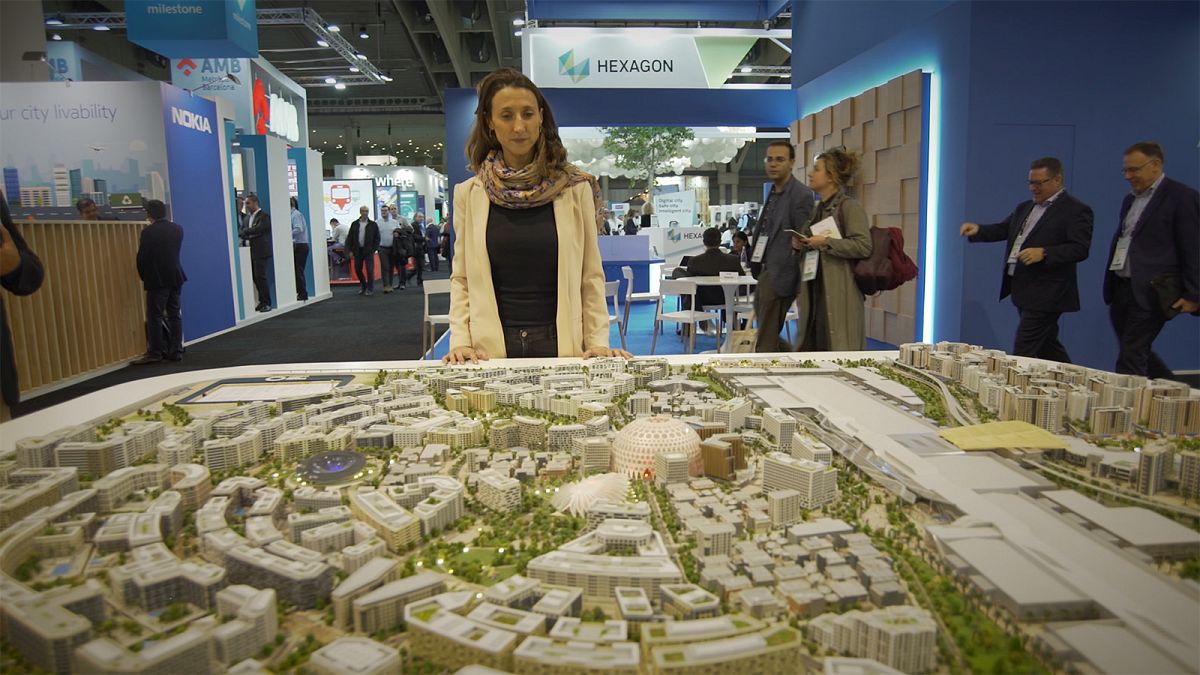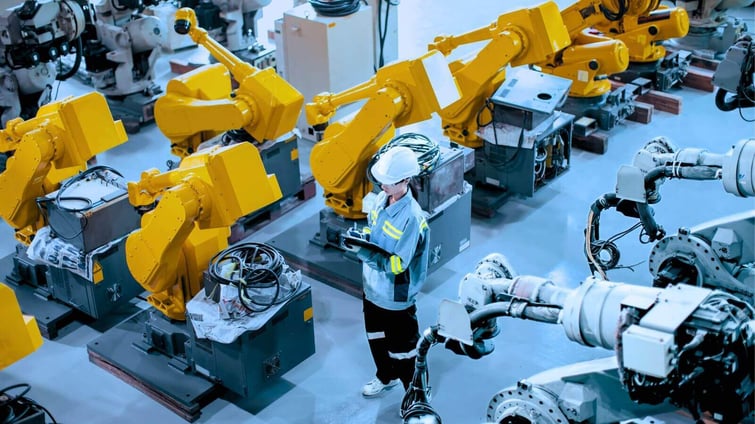As we stand at the crossroads of innovation and daily life, the Smart Revolution emerges not just as a wave of technological advancement, but as a transformative force reshaping the very fabric of our future. From autonomous vehicles weaving through bustling city streets to smart homes adapting to our every need, the integration of intelligent technologies into our routines is revolutionizing the way we live, work, and interact. This paradigm shift raises profound questions about efficiency, sustainability, and the very essence of human experience. Is our world becoming smarter, or are we merely scratching the surface of what lies ahead? The answer may redefine not only our future but the future of the planet itself.
Table of contents
ToggleThe Impact of Smart Technology on Everyday Life

The smart revolution is unfolding in front of us, touching every facet of our lives in ways we never imagined. With advancements in artificial intelligence, IoT (Internet of Things), and innovative applications, everyday tasks are becoming more efficient and intuitive.
From our homes to our workplaces, smart technology is redefining how we interact with our environment. Smart appliances in the kitchen can now suggest recipes based on available ingredients, while intelligent thermostats learn our schedules and optimize energy usage, significantly reducing utility costs.
In workplaces, automation and smart systems streamline operations. Consider the impact of agile methodologies powered by data-driven insights. Teams can collaborate seamlessly thanks to cloud-based platforms, leading to faster project completion and improved creativity.
Moreover, smart technology is empowering consumers to make informed choices. Wearable devices track health metrics, prompting users to live healthier lives, while smart home security systems offer peace of mind by monitoring homes in real-time.
As we move deeper into this revolution, several key trends are emerging:
- Connectivity: Enhanced connectivity among devices is creating a larger ecosystem of smart technologies.
- Personalization: Smart systems are increasingly tailored to individual preferences, making experiences unique.
- Sustainability: Smart technologies are designed to promote sustainable practices, reducing waste and energy consumption.
The evolution of smart technology doesn’t come without challenges. Many organizations face resistance to change from traditional methods, and there is a constant need to balance innovation with practicality and sustainability. Finding skilled talent who embrace a future mindset is crucial to navigating this landscape.
In the grand tapestry of the smart revolution, it is clear that as these technologies develop, they will continue to shape not only our interactions with devices but also our societal structures. Engaging in conversations about these changes, attending tech-focused webinars, and connecting with other industry leaders through platforms like LinkedIn can further enrich our understanding and preparedness for what lies ahead.
Transforming Daily Routines
The emergence of smart technology is intricately weaving itself into the fabric of our everyday lives, revolutionizing how we interact with the world around us. From the way we communicate to how we manage our homes, the implications are profound and far-reaching.
In the heart of this transformation lies the ability of smart devices to automate mundane tasks, allowing us to reclaim precious time. Imagine waking up to a home that adjusts the temperature to your liking, brews your coffee, and even suggests an optimal route to work based on real-time traffic data. This level of personalization is not just a luxury; it’s quickly becoming an expectation.
Enhancements in smart home technology empower users through improved energy efficiency and security. With automated lighting systems, energy consumption can be monitored and adjusted to reduce wastage. Smart security cameras can alert homeowners of unusual activity, providing peace of mind whether at home or away.
The impact extends beyond our homes and into our daily commutes. Smart transportation solutions, such as ride-sharing apps and connected vehicles, are redefining how we navigate urban environments. They foster a more sustainable approach to transportation, helping reduce congestion and emissions.
Furthermore, the integration of smart technology into our healthcare practices is noteworthy. Wearable health trackers enable individuals to monitor their fitness and wellness metrics in real time, promoting proactive health management. Telehealth services make healthcare more accessible, connecting patients to medical professionals without the need for in-person visits.
As we embrace this smart revolution, it’s crucial to remain mindful of its implications on society. Challenges include ensuring data privacy and fostering an equitable technology landscape that benefits everyone.
Smart technology is not merely a trend; it is a fundamental shift in how we live. Embracing these innovations can enhance our daily routines, boost our efficiency, and potentially pave the way for a more connected and sustainable future.
Enhancing Communication and Connectivity
The rise of smart technology is dramatically reshaping our society, weaving its influence into the fabric of our everyday experiences. From the way we communicate to how we manage our daily tasks, this revolution is not just a trend; it’s a transformative force that enhances our lives.
Communication has evolved through smart technology, connecting people across the globe instantaneously. Smart devices allow us to communicate through various channels such as video calls, messaging apps, and social networks. A few key features that enhance our communication include:
- Real-time interactions: Instant notifications and messaging keep us connected.
- Visual communication: Video conferencing tools enable face-to-face interaction regardless of distance.
- Accessibility: Voice-assisted technology allows people with disabilities to communicate more effectively.
Furthermore, smart technology is revolutionizing the way we stay connected to our surroundings. Smart homes equipped with IoT devices create an integrated living experience by allowing:
- Remote control: Manage appliances and systems from anywhere, enhancing convenience.
- Data-driven insights: Gather information to optimize energy consumption and enhance security.
- Interconnectivity: Devices communicate with each other, creating a seamless user experience.
As smart technology continues to advance, its impact on our daily communication and connectivity will only deepen. Embracing these innovations can lead to richer relationships and more efficient interactions, proving that the smart revolution truly is redefining our future.
Challenges Posed by Smart Innovations

The smart revolution is reshaping our world, offering unprecedented advancements and convenience. However, with these innovations come several challenges that must be addressed to ensure a sustainable and equitable future.
One of the significant hurdles is data privacy. As devices become more interconnected, vast amounts of personal information are collected. This raises concerns about how this data is used, stored, and shared. Users often find themselves navigating a complex landscape of privacy policies, many of which are confusing or inadequate.
Another pressing issue is the digital divide. While some regions experience the benefits of smart technologies, others lag behind due to economic constraints, lack of infrastructure, or limited access to education. This disparity can exacerbate existing inequalities, leading to a future where only a fraction of the population can fully leverage the advantages of the smart revolution.
Moreover, the integration of artificial intelligence and automation into various sectors introduces workforce disruptions. Many jobs are at risk of being eliminated, resulting in widespread anxiety about employment stability. Ensuring that the workforce is retrained and upskilled is crucial to mitigate these impacts.
Additionally, there’s the challenge of maintaining sustainability in the face of rapid technological advancements. The production and disposal of smart devices can strain natural resources and contribute to electronic waste. It’s vital for companies to adopt environmentally friendly practices in their design and operations.
The ethical implications of smart technologies also merit attention. Decisions made by algorithms can perpetuate biases or create unintended consequences. As we increasingly rely on these systems, establishing guidelines and oversight becomes essential.
In summary, while the smart revolution holds immense potential, the path forward must address these hurdles head-on:
- Data privacy
- Digital divide
- Workforce disruption
- Sustainability practices
- Ethical considerations
By tackling these challenges, society can pave the way for a future where smart innovations truly enhance quality of life for everyone.
Privacy and Security Concerns
The smart revolution is undeniably reshaping our everyday experiences, presenting both opportunities and challenges along the way. As innovative solutions emerge, they bring with them complexities, particularly regarding privacy and security.
With the rise of smart technologies, the risk of data breaches has escalated. More devices connected to the internet means more entry points for potential cyber attacks. This raises pressing questions about how personal information is collected, stored, and utilized. Key issues surrounding privacy include:
- Data Misuse: Personal data may be exploited for marketing or sold to third parties without consent.
- Surveillance: Continuous monitoring through smart devices can lead to a sense of being constantly watched.
- Lack of Transparency: Companies often do not disclose how data is managed, leaving consumers uninformed.
Moreover, the dependency on smart technologies opens doors to sophisticated security threats. Aside from personal risks, these vulnerabilities can also impact businesses and infrastructure. Companies adopting smart innovations must prioritize comprehensive security measures to protect themselves and their consumers. Key considerations include:
- Regular Software Updates: Ensuring all devices receive timely security updates is critical to safeguarding them from breaches.
- Robust Authentication: Implementing two-factor authentication can add an additional layer of protection.
- Employee Training: Educating staff about potential threats can help mitigate risks associated with human error.
As the smart revolution continues to evolve, addressing these privacy and security concerns will be essential for the successful integration of these technologies into society. It requires a collaborative approach between developers, companies, and consumers to ensure a sustainable and secure technological future.
Job Displacement and Economic Implications
The rise of the Smart Revolution brings forth transformative advancements that are reshaping industries and everyday life. However, this evolution isn’t without its challenges. Among the most pressing are the concerns surrounding job displacement and the broader economic implications.
As automation and artificial intelligence become integral to operations in various sectors, traditional roles are being rendered obsolete. This creates a ripple effect in the job market, impacting not just individual workers but entire communities. Here are some key points regarding the challenges posed by smart innovations:
- Job Loss: The automation of tasks can lead to significant job losses, especially in industries that rely heavily on manual labor.
- Skill Gaps: As technology evolves, the demand for new skills increases, leaving behind workers who may not have access to retraining opportunities.
- Income Inequality: The disparity between those who can adapt to new technologies and those who cannot may exacerbate economic divides.
- Support Structures: The need for strong social safety nets becomes paramount, as displaced workers require assistance in transitioning to new roles.
Moreover, while smart innovations offer increased efficiency and productivity, they also present complexities concerning the economic landscape. The focus on tech-driven solutions must be balanced with considerations for human impact and societal well-being.
As we navigate through this smart era, fostering a culture of continuous learning and adaptation is crucial. Strategies that emphasize collaboration between technology and the workforce can lead to sustainable growth and innovation, benefiting society as a whole.
The Future of Smart Technology
The Smart Revolution is not merely a wave of new technologies; it is a profound transformation that is reshaping the fabric of our daily lives. With advancements in artificial intelligence, the Internet of Things (IoT), and smart devices, we find ourselves at the cusp of an era that promises enhanced efficiency and unparalleled connectivity.
Imagine waking up to a home that knows your schedule better than you do. Smart assistants can adjust the temperature, brew your coffee, and even curate a playlist of your favorite morning tunes, all tailored to your personal preferences. This is just a glimpse of how smart technology is embedding itself into the core of our routines.
The workplace is equally transformed. Companies are increasingly adopting smart solutions to foster collaboration and innovation. From agile project management tools that streamline operations to smart analytics that provide real-time insights into consumer behavior, the workplace of the future is not only about efficiency but also about nurturing a culture of creativity.
- Enhanced decision-making: Access to data-driven insights allows leaders to make more informed choices.
- Improved employee engagement: Smart technologies foster a collaborative environment, empowering employees.
- Sustainability efforts: Smart solutions can drive environmentally friendly practices.
However, the journey is not without its challenges. Resistance to change can hinder progress, especially in more traditional organizations. Balancing the push for innovation with the need for sustainability and practical application will be critical in navigating this new landscape. Companies must prioritize talent acquisition with a focus on emerging technologies to stay competitive.
As we embrace this smart revolution, it prompts important questions about its broader societal impact. How can we ensure equitable access to these technologies? What do these advancements mean for our daily interactions and relationships? Addressing these questions will help frame the future discourse on technology’s role in shaping our society.
Networking events, online platforms like LinkedIn, and specialized publications dedicated to innovation and sustainability will play vital roles in fostering these conversations. Organizations must not only adapt to newly emerging technologies but also lead discussions on their ethical implications.
Ultimately, the current wave of smart advancements is redefining our future, inviting us to reimagine the possibilities of everyday life. Embracing a future-focused mindset will be essential in maximizing the benefits of this technological evolution.
Emerging Trends and Developments
The smart revolution is rapidly transforming the landscape of technology and society, dictating the way we live, work, and interact. As we delve into today’s innovations, we uncover how these advancements not only enhance our day-to-day experiences but also set the stage for a more efficient and connected future.
At the heart of this transformation lies the integration of interconnected devices and systems, commonly known as the Internet of Things (IoT). Smart homes equipped with automated lighting, climate control, and security systems provide residents with unprecedented control at their fingertips. The efficiency gained here exemplifies how minor adjustments can lead to significant changes in energy consumption and resource management.
Another pivotal area is the emergence of artificial intelligence (AI), which has permeated various industries. From personalized recommendation systems on streaming platforms to sophisticated algorithms enhancing customer service, AI is redefining industrial productivity and consumer interaction. As organizations embrace these technologies, they find that innovation is not just about adopting the latest tools but adjusting their operational frameworks to foster adaptability.
Moreover, advancements in machine learning are propelling industries into a new era of predictive analytics. Businesses can utilize insights derived from consumer behavior and market trends to make informed decisions, optimize resources, and tailor products or services to meet emerging demands. These capabilities are vital for remaining competitive in an ever-evolving market landscape.
In healthcare, the smart revolution is equally significant. Telemedicine and wearable health technologies empower patients to monitor their well-being more closely and access care remotely. These innovations are not only enhancing patient experience but also prioritizing preventive care, which can lead to better health outcomes.
The potential of smart technology during crises, such as pandemics, has underscored its importance in ensuring public safety and health management. Real-time data collection and analysis can facilitate timely responses, efficient resource allocation, and improved communication between authorities and communities.
As we venture further into this smart landscape, societal implications become a focal point. The balance between adopting innovative solutions and addressing ethical concerns—including privacy and data security—will shape our collective future. Embracing a mindset of sustainability and responsibility alongside powerful technologies is essential to truly benefit from the smart revolution.
In summary, the ever-evolving tapestry of smart technology is interwoven with trends that promise to reshape the core of our existence. From enhancing productivity to redefining personal health and connectivity, it is clear that the smart revolution is indeed charting a course into a future rich with possibility.
Sustainability and Smart Solutions
The shift towards a smart future is not merely a trend; it is fundamentally altering how we interact with our world. Smart technology is becoming an integral part of our daily lives, reshaping everything from our homes to our workplaces. The future of smart technology promises enhanced connectivity and efficiency, which play a crucial role in addressing both consumer demands and global challenges.
Among the most significant advancements is the rise of sustainable practices driven by smart solutions. These innovations enable us to use fewer resources while maximizing productivity. Across various sectors, intelligent systems are improving efficiency and reducing waste, leading to a more environmentally friendly approach to growth.
Smart solutions encompass a wide array of technologies, including:
- Smart grids that optimize energy consumption.
- IOT devices for real-time monitoring and management.
- Smart buildings designed for energy efficiency.
- Automated transportation systems that minimize emissions.
These solutions not only reduce our carbon footprint but also contribute to a circular economy. By promoting responsible consumption and production, the smart revolution aligns with global sustainability goals.
Incorporating technology in our lives is not solely about convenience; it is about fostering a future that values sustainability and innovation. With the rise of eco-friendly approaches, companies are increasingly expected to adopt practices that reflect a commitment to the planet. This cultural shift encourages organizations to focus on sources of renewable energy, thereby reshaping operational strategies.
As we move forward, the smart revolution holds immense potential to create a future that thrives on efficiency and responsibility. Embracing these technologies not only enhances our quality of life but also supports the sustainability of our planet for generations to come.










